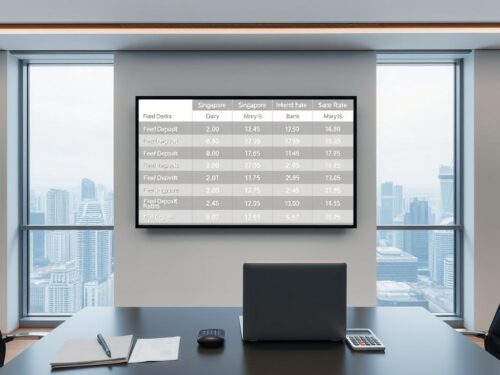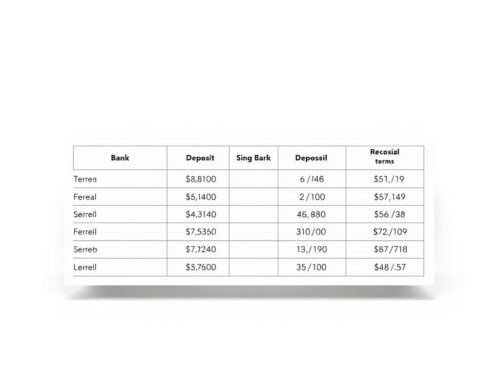When it comes to growing your savings, fixed deposit options remain a popular choice. With varying interest rates and flexible terms, they offer a secure way to earn returns. However, recent trends show a slight decline in deposit rates, making it essential to compare available options carefully.
For example, some banks like Bank of China offer competitive rates of 1.65% per annum for short-term deposits. Meanwhile, alternatives like cash management accounts provide higher returns without lock-in periods. It’s also worth noting that recent updates to the SDIC insurance coverage have enhanced depositor protection, giving you added peace of mind.
Whether you’re looking for short-term gains or long-term stability, understanding the current landscape can help you make informed decisions. Let’s dive into the details to find the right fit for your financial goals.
Key Takeaways
- Fixed deposit options remain a secure way to grow savings.
- Interest rates vary across banks and terms.
- Cash management accounts offer higher returns without lock-ins.
- Recent SDIC updates provide better depositor protection.
- Compare options to find the best fit for your needs.
Introduction to Fixed Deposits in Singapore
Fixed deposits have long been a trusted method for securing your savings. They allow you to lock in a lump sum at a predetermined interest rate, ensuring steady returns over a set period. For example, a deposit of S$10,000 at 1.60% per annum would earn S$160 in a year.
Unlike regular savings accounts, which often offer lower rates like 0.05% per annum, fixed deposits provide higher returns. This makes them an attractive option for risk-averse individuals looking to grow their savings securely.
What is a Fixed Deposit?
A fixed deposit is a financial product where you deposit a lump sum with a bank for a fixed tenure. The bank pays you a guaranteed interest rate over this period. The formula to calculate your returns is simple: Principal × Rate × (Tenure/12).
For instance, if you deposit S$10,000 at 1.60% for 12 months, your earnings would be S$160. This predictability is one of the key reasons why fixed deposits remain popular.
Why Choose Fixed Deposits in 2023?
In the current market, fixed deposits continue to be a viable option despite slightly declining interest rates. They offer stability and security, especially for those who prefer low-risk investments.
One major advantage is the deposit insurance provided by the Singapore Deposit Insurance Corporation (SDIC). This ensures your deposits are protected up to S$100,000 per depositor, giving you peace of mind.
“Fixed deposits are a safe haven for those who value stability over high-risk, high-reward investments.”
Additionally, the Monetary Authority of Singapore (MAS) ensures a stable banking environment, further reducing risks. While foreign currency fixed deposits may offer higher returns, they come with exchange rate risks, making local fixed deposits a safer choice.
Some people worry about liquidity constraints with fixed deposits. However, strategies like the ladder strategy can help. By staggering your deposits across different tenures, you can access funds periodically without breaking all your deposits at once.
| Product | Interest Rate | Liquidity |
|---|---|---|
| Fixed Deposit | 1.60% p.a. | Low |
| Savings Account | 0.05% p.a. | High |
Fixed deposits may not offer the flexibility of savings bonds or high-yield accounts, but their predictability and security make them a strong contender for your savings strategy.
Best Fixed Deposit Rates in Singapore 2023
Exploring the top options for growing your savings can be overwhelming. With varying fixed deposit rates and promotional offers, it’s essential to compare carefully to maximize your returns. Let’s break down the key details to help you make an informed decision.
Top Banks Offering Competitive FD Rates
Several banks stand out for their attractive deposit rates Singapore. For example, Bank of China offers a mobile promotion with 1.65% p.a. for a 3-month tenure, with a minimum deposit of S$500. DBS provides tiered rates, offering 1.60% p.a. for amounts below S$20,000 but dropping to 0.05% for larger deposits.
Citibank also has a promotional rate of 1.40% p.a., compared to its standard rate of 0.80%. These variations highlight the importance of comparing options based on your deposit amount and tenure preferences.
Promotional Rates vs. Standard Rates
Promotional rates often provide higher returns but come with specific conditions. For instance, HSBC requires a minimum of S$30,000 for its premier rates. Additionally, some banks offer better rates for digital placements, like BOC, where online deposits yield 0.30% more than branch placements.
Here are some key points to consider:
- Shorter tenures (3-6 months) typically offer the best returns.
- Many promotions require “fresh funds,” so check the terms carefully.
- Promotional rates often have expiration dates, so act quickly.
- ICBC allows deposits as low as S$500 via e-banking, making it accessible for smaller investors.
Understanding these nuances can help you choose the right option for your financial goals.
Bank of China Fixed Deposit Rates
Bank of China offers competitive fixed deposit options tailored to modern banking needs. Whether you prefer mobile banking or over-the-counter services, the bank provides flexible solutions to grow your savings. Let’s explore the details to help you make an informed decision.
Mobile Banking Promotions
Bank of China’s mobile banking promotions are designed for convenience and higher returns. For example, you can earn an interest rate of 1.65% p.a. for a 3-month tenure with a minimum deposit of S$500. This option is ideal for those who prefer digital banking and quick access to their funds.
To enroll, download the Bank of China mobile app and follow these steps:
- Register using your personal details.
- Link your account via PayNow or PayLah for seamless fund transfers.
- Select the desired tenure, ranging from 1 to 24 months.
It’s important to note that promotional rates may change frequently, so act quickly to secure the best deal.
Over-the-Counter Rates
For those who prefer traditional banking, over-the-counter (OTC) services are available. The interest rate for a 3-month tenure is 1.35% p.a., with a minimum deposit of S$20,000. This option suits individuals with larger savings looking for secure returns.
When using OTC services, keep these points in mind:
- Cheque deposits are required for fund transfers.
- Promotional rates may differ from mobile banking offers.
- Renewal policies post-maturity vary, so confirm details with the bank.
While senior citizen-specific rates are unavailable, Bank of China’s general offerings remain accessible to all age groups.
DBS/POSB Fixed Deposit Rates
DBS and POSB offer a range of fixed deposit options tailored to meet diverse financial needs. Whether you’re looking for short-term gains or long-term stability, their flexible terms and competitive interest rates make them a popular choice. Let’s explore the details to help you make an informed decision.
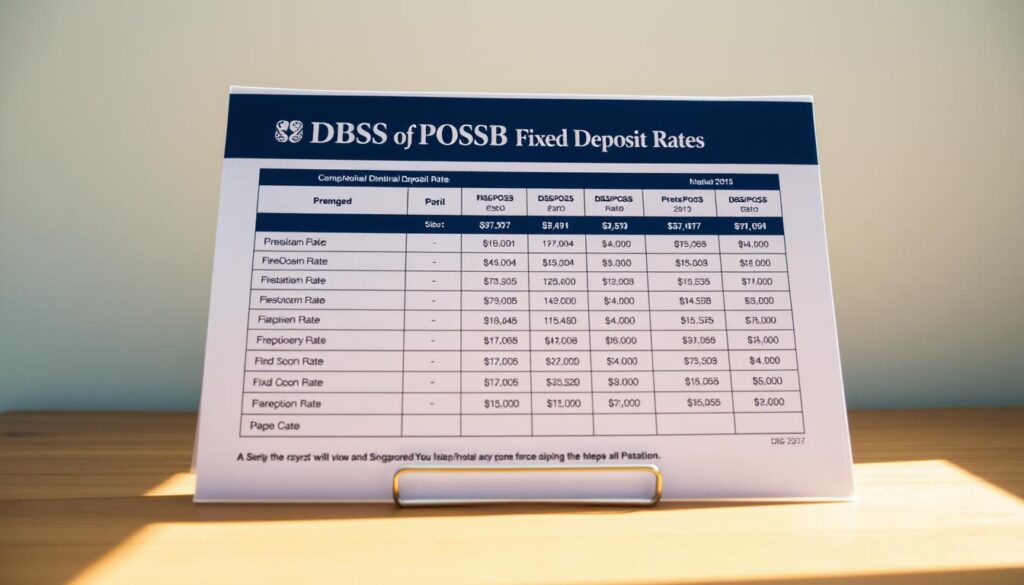
Short-Term vs. Long-Term Rates
DBS provides attractive deposit rates for both short and long tenures. For example, a 12-month deposit offers 1.60% for amounts below S$20,000. However, rates drop significantly to 0.05% for deposits above this threshold. This unusual inverse relationship means smaller deposits often yield higher returns.
For those seeking flexibility, the 7-month tenor at 1.55% is a great option. It balances competitive returns with shorter lock-in periods. Auto-renewal options are also available, ensuring your funds continue to grow without manual intervention.
Special Offers for Senior Citizens
DBS and POSB provide exclusive benefits for senior citizens aged 55 and above. They offer a bonus of +0.10% on standard interest rates, making their fixed deposits even more appealing. This additional return can significantly boost savings over time.
However, it’s important to note that joint accounts are excluded from these promotions. Additionally, the Premier Income Account requires a minimum balance to access higher deposit rates, so be sure to check the terms before committing.
“DBS and POSB’s fixed deposits are designed to cater to a wide range of customers, from young professionals to retirees.”
When choosing between digibank and branch placements, digital options often provide better rates and convenience. However, branch services remain a reliable choice for those who prefer face-to-face banking interactions.
Be mindful of the rate cliffs at the S$20,000 threshold. Depositing just above this amount can drastically reduce your returns, so plan your savings strategy accordingly.
CIMB Fixed Deposit Rates
CIMB provides a range of fixed deposit options tailored to different financial needs. Whether you’re saving for the short term or planning for the future, their flexible terms and competitive interest rates make them a reliable choice. Let’s explore the details to help you decide which option suits you best.
Personal Banking vs. Preferred Banking
CIMB offers two main banking tiers: Personal and Preferred. Preferred Banking clients enjoy higher interest rates, such as 1.65% for a 3-month tenure, compared to 1.60% for Personal Banking. However, both tiers require a minimum deposit of S$10,000.
To qualify for Preferred Banking, you’ll need to maintain a higher account balance or meet specific criteria. This tier is ideal for those with larger savings looking for better returns. Personal Banking, on the other hand, is accessible to a wider audience, making it a great starting point for smaller investors.
Online Placement Benefits
Placing your fixed deposit online comes with several advantages. The application process is straightforward, whether you use a mobile device or desktop. Simply log in to your CIMB account, select the desired tenure, and transfer your funds.
Here are some key benefits of online placement:
- Higher rates for shorter tenures (3-6 months).
- Convenient fund sourcing via existing balances or transfers.
- Promotional rates available until 10 March 2025.
However, be aware of CIMB’s FAST transfer limitations, which may affect how quickly you can move your funds. Always check the terms before proceeding.
“CIMB’s online fixed deposits combine convenience with competitive returns, making them a smart choice for modern savers.”
While senior citizen-specific rates are not available, CIMB’s general offerings remain accessible to all age groups. Whether you’re a seasoned investor or just starting, CIMB’s fixed deposit options provide a secure way to grow your savings.
OCBC Fixed Deposit Rates
OCBC stands out as a reliable choice for those seeking secure savings options. With competitive interest rates and flexible terms, their fixed deposits cater to a wide range of financial goals. Whether you prefer online convenience or in-branch services, OCBC provides tailored solutions to help you grow your savings.
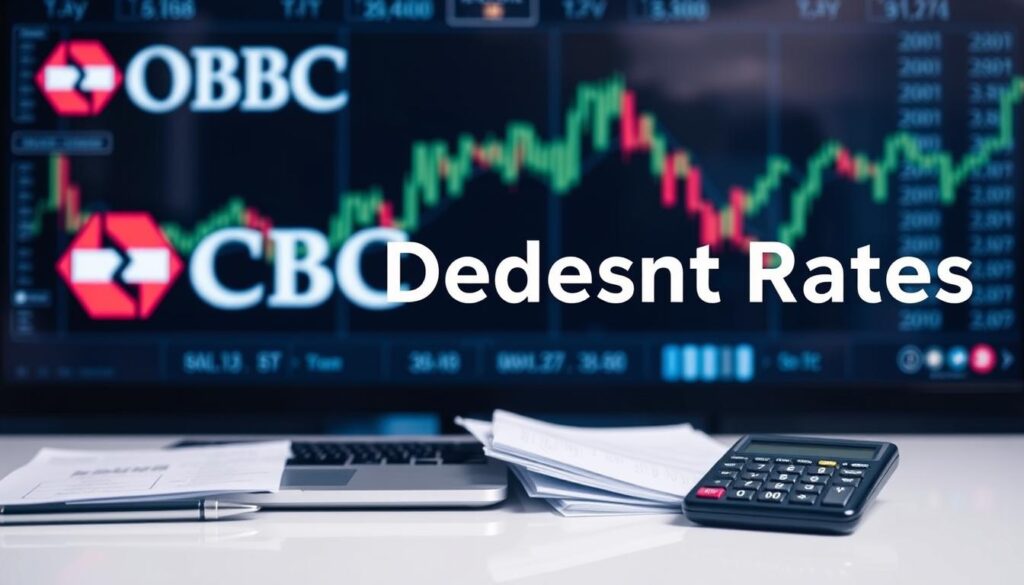
Branch vs. Online Rates
OCBC offers slightly higher interest rates for online placements compared to branch services. For example, a 9-12 month tenure yields 1.35% online, while branch placements offer 1.30%. This difference makes digital options more appealing for tech-savvy savers.
Online applications are straightforward and can be completed in minutes. Branch services, on the other hand, require physical documents like identification and proof of address. Choose the method that best suits your preferences and needs.
Minimum Deposit Requirements
To open a fixed deposit with OCBC, you’ll need a minimum of S$30,000. This requirement ensures that larger savings are rewarded with competitive returns. However, if you’re looking for smaller-scale options, consider OCBC’s 360 Account, which offers up to 7.65% interest under specific conditions.
Here are some key points to keep in mind:
- Corporate fixed deposits are available for businesses, offering tailored solutions.
- Rates remain consistent across different deposit sizes, ensuring fairness.
- CPF funds cannot be used for placements, so plan accordingly.
- A 30-day cooling period applies for repeat fixed deposits.
- Cheque deposits may take up to 2 business days to process.
“OCBC’s fixed deposits combine flexibility with competitive returns, making them a smart choice for savers of all kinds.”
Whether you’re an individual or a business, OCBC’s fixed deposit options provide a secure way to grow your savings. Compare their rates with other products like the 360 Account to find the best fit for your financial goals.
UOB Fixed Deposit Rates
UOB’s fixed deposit options provide a mix of flexibility and competitive returns for savers. With tenures ranging from 1 to 36 months, you can choose a plan that aligns with your financial goals. Whether you’re looking for short-term gains or long-term stability, UOB offers tailored solutions to meet your needs.
Promotional Rates for Fresh Funds
UOB’s promotional rates are designed to reward new deposits. For example, a 6-month tenure offers an interest rate of 1.50% with a minimum deposit of S$10,000 in fresh funds. Fresh funds refer to money not previously held with UOB, ensuring new customers benefit from these attractive rates.
Other options include a 10-month tenure at 1.30% and a 36-month tenure at 1.60%. These rates are competitive in the current market, making UOB a strong contender for your savings strategy. However, promotional rates are subject to change after 29 March 2025, so act quickly to secure the best deal.
Flexible Tenure Options
UOB’s fixed deposits stand out for their flexibility. You can choose tenures as short as 1 month or as long as 36 months, depending on your financial goals. This range allows you to tailor your savings plan to your specific needs.
For joint accounts, the same interest rates apply, making it a convenient option for couples or partners. However, UOB does not offer online-exclusive rates, so you’ll need to visit a branch or use a cheque or cashier’s order to deposit your funds.
When comparing UOB’s fixed deposits with other products like the UOB One Account, which offers up to 5.30% interest, consider your liquidity needs and investment horizon. Fixed deposits provide guaranteed returns but require a lock-in period, while savings accounts offer more flexibility.
Factors to Consider When Choosing a Fixed Deposit
Selecting the right fixed deposit requires careful consideration of several factors. While interest rates are often the primary focus, other elements like minimum deposit requirements and early withdrawal penalties can significantly impact your returns. Understanding these details ensures you make an informed decision that aligns with your financial goals.
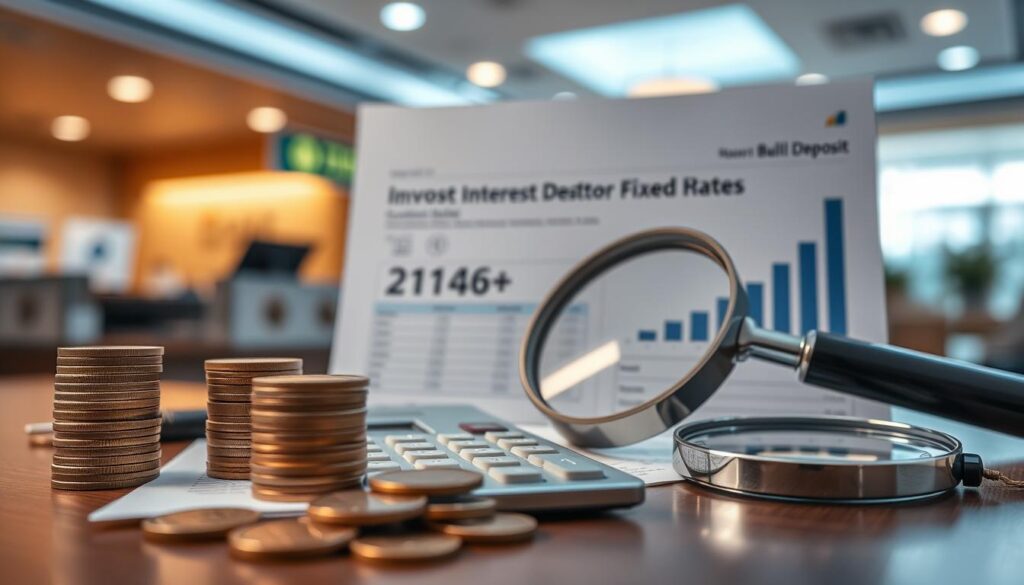
Interest Rates and Tenures
When comparing fixed deposits, the interest rate and tenure are crucial. Shorter tenures, such as 3-6 months, often offer higher returns but require more frequent renewals. Longer tenures provide stability but may lock your funds for extended periods. Consider your financial needs and choose a tenure that balances returns with flexibility.
Some banks offer “step-up” options, where the interest rate increases over time. These can be ideal if you expect rates to rise. Always check promotional rate eligibility periods, as they may expire quickly.
Minimum Deposit Requirements
The minimum deposit amount varies across banks and can influence your returns. For example, some banks offer better rates for larger deposits, while others cater to smaller investors. Analyze your savings and choose a bank that aligns with your deposit size.
Hidden fees, such as statement charges or renewal fees, can also affect your overall returns. Always read the fine print to avoid unexpected costs.
Early Withdrawal Penalties
Breaking a fixed deposit before maturity often incurs penalties. For instance, HLF charges S$50 plus 0.10% of the withdrawn amount. Compare penalty structures across banks to understand the potential costs.
Some banks, like RHB, allow partial withdrawals, providing more flexibility. However, this may reduce your overall returns. Plan your savings strategy carefully to avoid unnecessary penalties.
“Understanding the fine print of fixed deposits can save you from unexpected costs and maximize your returns.”
Finally, consider FD nomination requirements, which ensure your funds are transferred to a beneficiary if needed. This step adds an extra layer of security to your savings.
For a detailed comparison of fixed deposit options, visit this guide to make the best choice for your financial future.
Fixed Deposits vs. Singapore Savings Bonds (SSB)
Choosing between fixed deposits and Singapore Savings Bonds (SSB) can shape your financial strategy. Both options offer secure ways to grow your savings, but they cater to different needs. Understanding their key differences helps you make informed decisions.
Interest Rate Comparison
When comparing deposit interest, SSBs often outperform fixed deposits. For example, the 10-year average for SSBs is 3.09%, while fixed deposits typically offer around 1.60%. This makes SSBs a better choice for long-term savers.
However, fixed deposits provide predictable returns over shorter periods. If you prefer stability over higher returns, fixed deposits might be more suitable. Always consider your financial goals when deciding.
Liquidity and Flexibility
SSBs offer greater flexibility compared to fixed deposits. You can redeem SSBs after just one month, making them ideal for those who need access to their funds. Fixed deposits, on the other hand, lock your money for a set period, which can range from a few months to several years.
Another advantage of SSBs is their step-up interest structure. The interest rate increases over time, rewarding long-term holders. Fixed deposits, however, maintain a constant rate throughout the tenure.
Here’s a quick comparison of key features:
- Application Process: SSBs can be applied for via ATMs, while fixed deposits often require bank apps or branch visits.
- Investment Cap: SSBs have a S$200,000 cap per individual, whereas fixed deposits allow unlimited amounts.
- Default Risk: SSBs are backed by the government, while fixed deposits are protected by SDIC up to S$100,000.
- Tax Treatment: SSB interest is tax-free, while fixed deposit interest may be subject to taxation.
- Issuance Schedule: SSBs are issued monthly, providing regular opportunities to invest.
“Understanding the differences between fixed deposits and SSBs ensures you choose the right tool for your financial goals.”
Whether you prioritize higher returns or flexibility, both options have their merits. Evaluate your needs and the current market conditions to make the best choice for your savings strategy.
Fixed Deposits vs. Treasury Bills (T-Bills)
Deciding where to park your funds requires a clear comparison of available options. Both fixed deposits and treasury bills offer secure ways to grow your savings, but they cater to different needs. Understanding their key differences can help you make an informed decision.

Risk and Return Comparison
When it comes to return, treasury bills often outperform fixed deposits. For example, the latest 6-month T-bill yield is 1.77%, compared to fixed deposits offering around 1.60%. This makes T-bills a better choice for those seeking higher returns.
However, fixed deposits provide predictable earnings over a set period, making them ideal for risk-averse investors. T-bills, on the other hand, are zero-coupon instruments, meaning you buy them at a discount and redeem them at face value. This structure can lead to capital gains but also introduces price volatility if sold before maturity.
Another factor to consider is protection. Fixed deposits are insured up to S$100,000 by the SDIC, while T-bills are backed by the Singapore government. Both options offer strong security, but the choice depends on your risk tolerance.
Investment Tenure Differences
The investment tenure for T-bills and fixed deposits varies significantly. T-bills are typically issued for 6 or 12 months, with auctions held every two weeks. This frequent issuance provides flexibility for investors to reinvest or adjust their portfolios.
Fixed deposits, however, offer a wider range of tenures, from as short as 1 month to as long as 5 years. This allows you to tailor your savings plan to your specific goals. For example, if you need access to your funds in the short term, a 3-month fixed deposit might be more suitable than a 6-month T-bill.
Here’s a quick comparison of key features:
- Minimum Investment: T-bills require a minimum of S$1,000, while fixed deposits start at S$500.
- Liquidity: T-bills can be sold in the secondary market, but liquidity may vary. Fixed deposits are less liquid, with penalties for early withdrawal.
- Reinvestment Risk: Fixed deposits offer fixed interest rates, while T-bills may require reinvestment at potentially lower rates.
“Understanding the differences between fixed deposits and T-bills ensures you choose the right tool for your financial goals.”
For a detailed comparison of these options, visit this guide to compare T-bills and fixed deposits and make the best choice for your savings strategy.
Fixed Deposits vs. High-Yield Savings Accounts
Choosing the right savings option can significantly impact your financial growth. Fixed deposits and high-yield savings accounts are two popular choices, each with unique benefits. While fixed deposits offer predictable returns, high-yield accounts provide flexibility and higher interest rates under specific conditions. Understanding these differences helps you decide which option aligns with your financial goals.
Interest Rate Variability
One key difference lies in interest rate variability. Fixed deposits guarantee a set rate for the entire tenure, ensuring predictable returns. For example, a 12-month fixed deposit might offer 1.60% annually. In contrast, high-yield savings accounts often have variable rates tied to specific conditions.
Take the UOB One account, which offers up to 5.30% if you meet spending and salary crediting requirements. Similarly, the OCBC 360 account provides a base rate of 2.45%, with bonuses for activities like credit card spending. These accounts reward active management but require consistent effort to maximize returns.
Accessibility and Liquidity
Another factor to consider is accessibility. Fixed deposits lock your money for a set period, with penalties for early withdrawal. This makes them less liquid but ideal for those who don’t need immediate access to their funds.
High-yield savings accounts, on the other hand, offer greater liquidity. You can withdraw funds without penalties, making them suitable for emergency savings. However, some accounts have transaction limits or require maintaining a minimum balance to earn the highest rates.
Here’s a quick comparison of key features:
| Feature | Fixed Deposits | High-Yield Savings Accounts |
|---|---|---|
| Interest Rate | Fixed | Variable (based on conditions) |
| Liquidity | Low | High |
| Effort Required | Set-and-forget | Active management |
| Rate Caps | None | Often capped (e.g., first S$75k) |
“High-yield savings accounts offer flexibility and higher returns, but they require active management to maximize benefits.”
When deciding between these options, consider your financial habits and goals. If you prefer a hands-off approach, fixed deposits might be the better choice. For those willing to meet specific conditions, high-yield savings accounts can provide greater returns.
Conclusion: Is a Fixed Deposit Right for You?
For those seeking stability, fixed deposits remain a reliable choice. They are ideal for low-risk investors who prioritize predictable returns over high volatility. If you’re building wealth or diversifying your portfolio, these deposits can provide a steady foundation.
However, it’s important to consider inflation risks, especially with long-term deposits. To mitigate this, try laddering your deposits across different tenures. This strategy ensures periodic access to funds while maintaining steady growth.
Compared to robo-advisor cash options, fixed deposits offer guaranteed interest rates and SDIC protection. Yet, they may not match the flexibility of high-yield accounts. Always evaluate your financial goals and liquidity needs before committing.
For rate monitoring, join communities like Beansprout to stay updated. Whether you’re saving for emergencies or long-term goals, fixed deposits can be a valuable tool in your financial toolkit.


